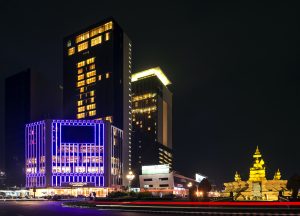A prominent union leader who led a high-profile strike at a Phnom Penh casino complex has been released from prison, vowing to continue her fight for workers’ rights. Chhim Sithar, the leader of the Labor Rights Supported Union of Khmer Employees (LRSU), was released from Prey Sar prison in Phnom Penh early yesterday morning. She immediately gave several press interviews in which she pledged to continue leading workers who are demanding better wages and working conditions at the NagaWorld casino.
Speaking to the Associated Press, she said that her union “will continue holding strike action,” despite the heavy-handed government response. “It is a mistake for those who think that putting people in the prison can stop workers from protesting,” she told Radio Free Asia. “Most people fear being in prison. I fear it too,” she said. “But for me and my union team, we are more afraid of losing our rights.”
Sithar arrested in November 2022 after returning from Australia, where she attended a 12-day trade union conference. She was then sentenced in May 2023 to two years’ imprisonment, including time already served, for incitement to commit a felony.
Sithar led a strike of hundreds of workers that began in December 2021 to protest mass layoffs and alleged union-busting at the NagaWorld casino in the capital Phnom Penh – the longest such labor action in the country’s history.
The workers launched their strike after NagaWorld management laid off 1,329 workers in April 2021, during the economic downturn of the COVID-19 pandemic. The LRSU demanded the reinstatement of 365 dismissed workers as well as fair compensation from the Malaysian-owned casino, which holds an exclusive license to run casinos in the Cambodian capital.
The Cambodian government responded to the strike action with the full force of the law. As the advocacy group Human Rights Watch reported in November 2022, “police, non-uniformed police, and other security forces confronted strikers with excessive use of force, and forcibly removed them from picket lines onto city buses to transport them to the outskirts of the capital.” In addition to Sithar, several dozen striking workers were arrested during the course of the strike campaign.
In January 2022, a month after the labor action began, Sithar, who had been working at NagaWorld since 2007, was arrested and spent 74 days in pretrial detention on charges of “incitement to commit a felony.” She was then re-arrested in November of that year for violating her bail conditions. At her sentencing in May 2023, the Phnom Penh Municipal Court also sentenced eight other union members to shorter suspended prison sentences.
The government is clearly jittery about the possibility of a resumption of the strike. According to RFA, prison officials transported Sithar directly to her home in the Cambodian capital in order to forestall a possible demonstration outside the prison.
The Cambodian government’s heavy-handed response to the NagaWorld strike reflects its tendency to view any form of opposition as a foreign-backed attempt to topple it from power. It also reflects its fear about any potential mobilization of the country’s new industrial working class, which has historically enjoyed close links to the Cambodian opposition.
While Cambodia’s trade union movement has long had links with the political opposition, government-aligned media outlets and Facebook groups have insinuated that Sithar and the LRSU were trained by foreigners to lead the strike against NagaWorld. This is consistent with claims made by the ruling Cambodian People’s Party for the past decade, that hostile foreign forces are seeking to launch a “color revolution” aiming to remove it from power.
This notion of an impending “color revolution” has legitimized an array of repressive actions against the country’s civil society and independent press, which have been shackled over the past eight years to the extent that it is hard to describe Cambodia as anything but a one-party state. In this context, it would be no surprise if a reignition of the NagaWorld strike is met once again with overwhelming legal and physical force.

































